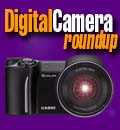|
Digital Camera Chronicles
18 -- Why I still wish the Mac had won
(Mar 2001)
(by Conrad H. Blickenstorfer)
 I am writing this installment of my column on my Mac, as I always do. I love Macs, but I am not an Apple zealot. I simply believe in using the best tool for any given job, and I am also interested enough in different operating system platforms to want to stay current on the major ones. I generally do layout and Photoshop work on a PowerMac G4, which is my main workstation. But I also have a Windows notebook on my desk that I use for web browsing, database work, and to install and test most of the new software that finds its way into my office. In our server room we have machines running Apple's OS X Server, IBM's version of Unix (AIX), Microsoft Windows 2000 Advanced Server, and a Linux-based web server. That's in addition to a variety of assorted handhelds and PDAs that I carry with me most of the time. Still, I definitely have a soft spot in my heart for Macs. I had one of the original 128K Macs back in 1984. That was followed by a Mac Plus, a Mac II, one of the "wicked fast" Mac IIfx models, a smooth Quadra 700, a couple of Performas, a PowerMac 8500, a dual-processor PowerMac 9600, a 300MHz PowerMac G3, and my current dual-processor PowerMac G4. I also had one of every Apple Newton ever made, and my wife loves her original Bondi-blue iMac.
I am writing this installment of my column on my Mac, as I always do. I love Macs, but I am not an Apple zealot. I simply believe in using the best tool for any given job, and I am also interested enough in different operating system platforms to want to stay current on the major ones. I generally do layout and Photoshop work on a PowerMac G4, which is my main workstation. But I also have a Windows notebook on my desk that I use for web browsing, database work, and to install and test most of the new software that finds its way into my office. In our server room we have machines running Apple's OS X Server, IBM's version of Unix (AIX), Microsoft Windows 2000 Advanced Server, and a Linux-based web server. That's in addition to a variety of assorted handhelds and PDAs that I carry with me most of the time. Still, I definitely have a soft spot in my heart for Macs. I had one of the original 128K Macs back in 1984. That was followed by a Mac Plus, a Mac II, one of the "wicked fast" Mac IIfx models, a smooth Quadra 700, a couple of Performas, a PowerMac 8500, a dual-processor PowerMac 9600, a 300MHz PowerMac G3, and my current dual-processor PowerMac G4. I also had one of every Apple Newton ever made, and my wife loves her original Bondi-blue iMac.
Yet, the computer in my home office is not a Mac. It's an 800MHz Pentium III that I built myself from parts I bought at Fry's Electronics. I love building my own computers, but that's not the reason why I am using a PC at home. The real reason is that the Mac has become too limiting a platform for me to have fun with. I rarely ever watch TV but spend many hours in front of my computer, browsing the web, installing and reviewing new software, and just generally putzing around. Despite my great love for the Mac, there came a time a few years ago when I realized that it simply presented too many obstacles. In the early days of the Mac, all the really cool stuff was available on the Mac first. PC users had to wait, sometimes years. It used to take great effort to get a PC to do things that Macs could do right out of the box. PCs didn't have microphones or good sound. PCs didn't have SCSI ports, built-in networking and Ethernet, great video, decent mice, or avant garde software. Few people remember that AOL was once only available on the Mac, and that there was a time when PC versions of all that great Mac software were barely more than a joke.
I once wrote an article entitled "Why the Mac Will Win" that was published in Computerworld. In it I outlined all the many areas where the Mac was superior. The Mac, of course, didn't win, but that's just because of Apple's inordinate talent at snatching defeat from the jaws of victory. Today's PCs are really Macs. Microsoft copied everything that made the Mac special and made it available in its own operating environment. And since there are now so many more PCs than Macs, you can get PCs for much less money. So, in a way, the Mac did win. The concept of the Mac won. It's just that Apple wasn't the beneficiary. It's really a testimony to the basic goodness of the Mac that Apple, by now a company a fraction the size of Compaq or Dell or Gateway, is still here to crank out both the hardware and the software for computers that can still hold their own, though they have lost much of the luster and advantage they once had.
Sadly, having great ideas is not always enough. For example, Apple was the company that introduced and popularized laser printers to the consumer market. They stopped selling them a couple of years ago. Apple was also among the very first to make and sell digital cameras. They stopped selling those, too, a couple of years before digital cameras began taking over the world. Almost every innovation that first appeared in Apple products was eventually taken over, and perfected, by the PC crowd. The result?
Even though every Mac ever shipped since the original IIse has had a microphone, when I want to make an Internet call with MSN Messenger, I must use a PC because the Mac version doesn't yet support telephony. Even though virtually all imaging software originated on the Mac, the latest versions run faster and all-too-often better on the PC. And even though Apple has adopted a number of standards used in the PC world (such as the PCI bus, USB ports, and IDE disk drives), peripherals for Macs are almost always more expensive than those for PCs. If they are available at all. The iMac helped due to its great consumer appeal, but when you look around, it seems that its primary contribution to the world was that everybody else ripped off its translucent color scheme.
The sad fact is that the Mac is no longer as useful as it should to me as someone who loves, uses, and reviews digital cameras and the software that comes with them. Whereas I know that whatever I take home to review will always work on my Windows box, the same would not apply if I used a Mac in my home office. Many manufacturers make an effort to ship their digicams with software both for PCs and Macs, but a good number do not. And even those who do usually have more and often better software for the PC. There is a wealth of powerful and terrifically innovative imaging software available for Windows and not all that much for Macs. There is the occasional exception, but by and large, the Mac, the original imaging computer, is now an also-ran. And even if you find a good piece of software that you really like, unless you buy an Epson Stylus there is a good chance that your printer won't be supported.
Can I blame the industry for putting forth its best effort for what is an inferior platform--the PC running Windows--when that platform has grabbed something like 90% of the market? Certainly not. Microsoft played it smart and Apple didn't. The best technology doesn't always win.
But I can still dream. What if Apple had truly won and all the creative talent of all those software designers and developers out there could go into making great software for a great platform rather than forever fighting and debugging that ever-growing incredible blob that is Microsoft Windows?
|








